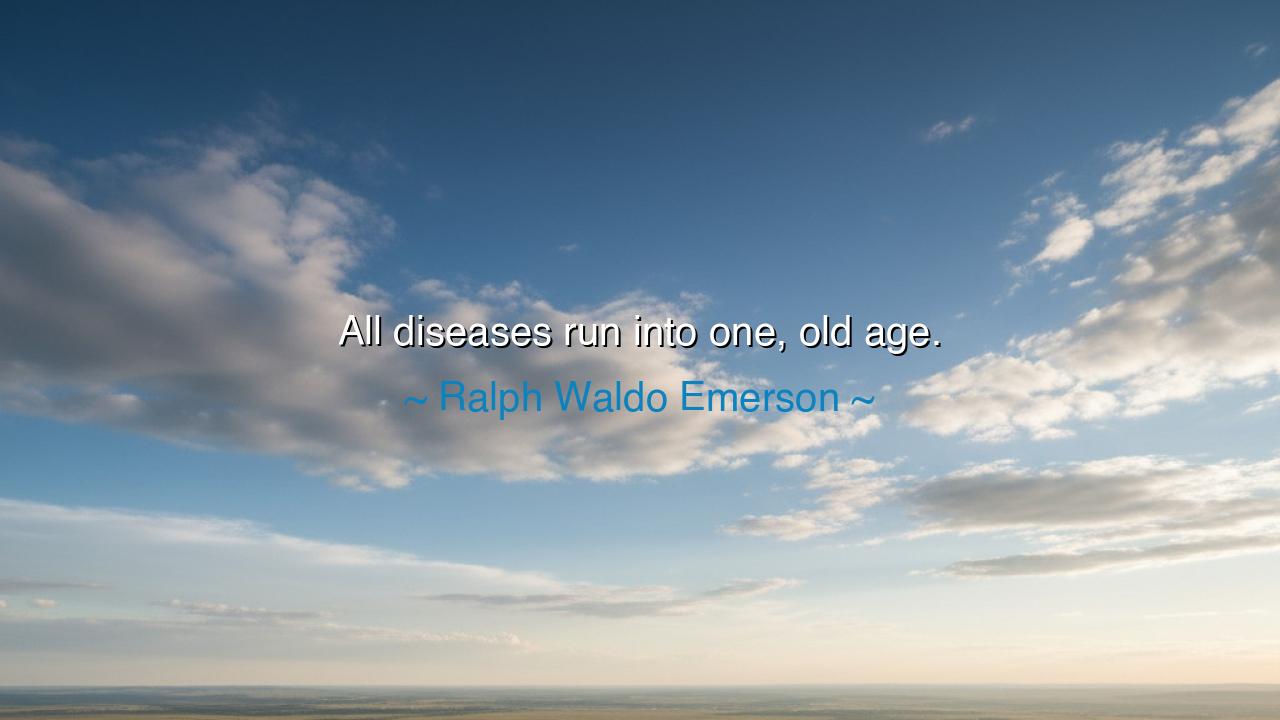
All diseases run into one, old age.






All diseases run into one, old age—these words of Ralph Waldo Emerson hold a profound truth about the inescapable journey of human life. In this simple yet powerful declaration, Emerson calls upon the wisdom of the ages to remind us that aging—that relentless force—encompasses all the ailments we endure as time passes. Though we may battle various illnesses in our youth, it is old age that, in its quiet inevitability, brings them all together in a single embrace. And thus, the struggles we face in our lives, whether of body or of mind, converge upon that final reckoning with time: old age.
In every age and in every civilization, the idea of aging has been feared and revered in equal measure. The ancient Greeks spoke often of the fleeting nature of youth and the wisdom that comes with age. But Emerson, with his keen observation, suggests something more—he suggests that old age is not just the culmination of life but the ultimate disease that all other afflictions build toward. He speaks not just of physical decline, but of the gradual erosion of our vitality, the loss of sharpness, and the creeping decay of every part of us that once seemed indestructible. Old age brings forth a universal affliction, one that is far more unavoidable than any temporary illness.
Take, for instance, the story of Alexander the Great, whose life was a triumph of youthful vigor and boundless ambition. He conquered vast lands, spread Greek culture, and shaped the course of history. But in his final years, after an untimely illness, his once invincible body succumbed to the ravages of age and disease. Despite his immense achievements, he could not escape the universal truth that old age would eventually claim him, just as it claims every soul. His empire, built in the strength of his youth, slowly unraveled as the inevitable toll of time caught up with him. And in his death, we see Emerson's words ring true: all the battles, all the victories, led to this singular end—old age.
Old age is not a mere passing phase of life; it is the great equalizer. It does not discriminate between the mighty and the humble, the wise and the foolish. Every person must face it, and each must contend with its presence in their own way. Some may greet it with grace, seeking to cherish the years that remain, while others may fight it with every ounce of their being, trying desperately to retain the strength of youth. But, as Emerson suggests, the battle is not against old age itself, but against the diseases that accompany it—the physical and mental ailments that grow with age.
A more recent example comes to mind with Mahatma Gandhi, whose life spanned the extremes of strength and frailty. In his later years, after leading his people to independence, he confronted the reality of his old age and the ailments it brought. But rather than succumb to bitterness or fear, he embraced the inevitable decline, remaining an enduring symbol of spiritual strength even in his final days. His example teaches us that the true victory over old age is not in resisting it, but in mastering the mind and spirit to remain steadfast in the face of its advances.
Old age thus becomes a teacher, a silent mentor guiding us toward humility and acceptance. Emerson's quote compels us to reflect on our own attitudes toward aging. Do we see it as the enemy, or do we recognize it as part of a natural and meaningful journey? It is easy to view old age as something to be feared, but perhaps the true wisdom lies in accepting it as an inevitable part of life, learning to embrace each moment with gratitude for the time we are granted.
In the end, Emerson's words remind us that no matter what we face in life, the disease of old age is the final one. The lesson here is clear: our struggles with health, our battles with time, and the inevitable decline of the body are not to be avoided or resisted, but understood as part of the human condition. To age gracefully, we must make peace with this truth, finding strength not in the prevention of old age, but in the acceptance and wisdom that come from embracing it.
Practical action? Let us strive to live fully, each day, making wise choices for our health and well-being. Let us value the experiences and lessons that come with each passing year, accepting that the true measure of a life well-lived is not the number of years we have, but the grace with which we accept the inevitable truth of old age. In the wisdom of the ancients, we are reminded: it is not the number of battles we fight that defines us, but how we stand when the final battle arrives. And so, may we meet that final battle with dignity, strength, and peace. Old age, in its embrace, is but another chapter in the story of our lives—an inevitable, yet precious, part of our journey.






AAdministratorAdministrator
Welcome, honored guests. Please leave a comment, we will respond soon